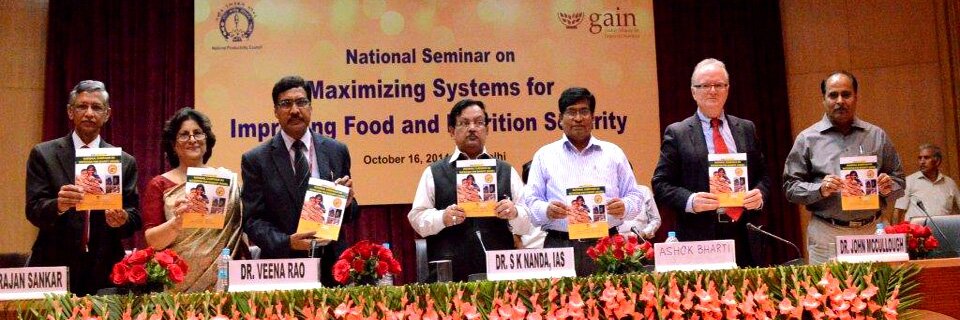16th October, 2014, On the occasion of World Food Day, Campaign on Nutrition for Dignity (NCND), an initiative of National Confederation of Dalit Organisations (NACDOR) in India, along with Global Alliance for Improved Nutrition (GAIN) launched 'action/Nutrition 2015’ public action in 6 states in India. In New Delhi, Global Alliance for Improved Nutrition in collaboration with National Productivity Council provided opportunity to release the IEC material of action/Nutrition 2015. Those present at this occasion included Director General of National Productivity Council Mr. Harbhajan Singh IAS, Additional Chief Secretary to Government of Gujarat Dr. S. K. Nanda IAS, Country Manager and Senior Advisor South Asia of Global Alliance for Improved Nutrition (GAIN) Dr Rajan Sankar, Formerly Secretary of Women and Child and currently Advisor, Karnataka Comprehensive Nutrition Mission of Government of Karnataka Dr. Veena Rao, Asia Regional Director of Micronutrient Initiative Mr. John McCullough, Prof. Dr. H. N. Mishra, IIT, Kharagpur and Mr. Ashok Bharti, Chairman of National Confederation of Dalit Organisations (NACDOR).
In state of Bihar, action/ Nutrition 2015 was organized in nine blocks (Hilsa, Kako, Hulasganj, Tankupa, Manpur, Mokama, Jhajha, Lakhisarai, and Buxar) of six districts namely Nalanda, Jehanabad, Patna, Jamui, Gaya, Lakhisarai and Buxer. A total of 2200 people including Panchayat Raj Institution members, community leaders and social activists participated in these Actions and demanded government of Bihar for taking immediate action to end malnutrition, hunger and poverty. In Hilsa block of Nalanda, meeting was held with representatives of print and electronic media.
In Jharkhand, actions like public meetings, demonstrations, Marchs, awareness meetings and press conference were organized in five blocks namely Bhandra, Giridih, Baghmara, Gola and Madhupur in five districts i.e. Lohardaga, Giridih, Dhanbad, Ramgarh and Deoghar. A total of 1700 people participated in these actions and urged government to ensure food and nutritional security of Dalits, Adivasis and other vulnerable in the state.
In Odisha, National Confederation of Dalit Organisations (NACDOR) organized an interface meeting with press and public meetings were held in five districts namely Khurda, Rayagada and Kalahandi. A total of 1000 people participated in these actions and asked the government to end malnutrition and hunger from the state.
In Madhya Pradesh, public organized action in Damoh, Teekamgarh, Morena, Teekamgarh and Rewa district, where a total of 400 people participated and pledged to work together for eliminating malnutrition and hunger.
In Uttar Pradesh, press meeting, marches, awareness drive were organized and demands were submitted in five districts where a total of 1200 people from Dalits, Adivasis and minorities participated. Similar Programs were organized in West Bengal where a total of 300 people participated in action programs and pledged to work for malnutrition and hunger free inclusive West Bengal.
Action/2015 is a global campaign by the civil society organisations and social organisations highlighting pressing development issues in the world and drawing the attention of the world leaders to include the most urgent development issues in the list of global development goals to be adopted by the world community under the leadership of United Nations in the year 2015 as the current global development framework of Millennium Development Goals expire in 2015 with much of the promises remaining unfulfilled.
National Campaign on Nutrition for Dignity (NCND) has been engaged in highlighting that India is facing a severe crisis of malnutrition despite major economic growth in recent years. According to the Third National Family Health Survey (NFHS-3, 2005-06), 20% of Indian children under five years old are wasted and 48% are stunted (NFHS 4 has still to be completed). Importantly, with 43% of children underweight, rates of child underweight in India are twice higher than the average figure in sub-Saharan Africa (22%). Age appears to be no deterrent to anaemia, around 55% of all women in India are anaemic in one form or another. More than one-third of Indian women suffer from chronic energy deficiency (CED); more than half suffer from anaemia and one fifth from both CED and anaemia. There are significant disparities among social and economic groups. Institutional deliveries are reported to be 51% for the general social categories, whereas this figure for Scheduled Tribes is only 17.7% and for Scheduled Castes, it is only 32.9%. Infant Mortality Rate for general category of population is only 55.7. It is 71 for the Scheduled Castes. The highest wealth quintile of Other Backward Classes shows the percentage of women suffering from CED at 19.4, whereas the lowest wealth quintile for the same social group shows this figure at 48.1.
It is evident that the crisis of malnutrition in India is serious and its main burden is carried by the most disadvantaged and socially excluded Dalits, Adivasis and other social groups facing social exclusion and extreme inequalities. NCND and NACDOR urge the Indian government to take serious note of this crisis and initiate urgent action without delay. The world leaders are also urged to take the nutrition security and the inequalities within the socio-economic groups in the nutrition context, as a measure challenge for the global development goals and commit for complete elimination of all forms of mal-nutrition.


